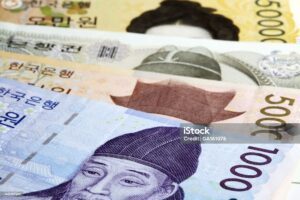The South Korean won saw a notable increase in value against the U.S. dollar after encouraging comments from Federal Reserve Chair Jerome Powell suggested that the central bank might begin cutting interest rates as soon as next month. This development has sparked optimism in the South Korean financial markets, though it has also highlighted ongoing challenges and uncertainties that investors must navigate.

The South Korean won appreciated by 0.57%, bringing the exchange rate to 1,320.5 won per dollar on the onshore trading platform. This rise in the won’s value comes as a direct response to Powell’s remarks, which have led many to believe that the era of high U.S. interest rates may be nearing its end. Lower U.S. interest rates generally weaken the dollar, making other currencies like the won more attractive to investors.
However, while the currency market responded positively, the reaction in the equity market was more subdued. The KOSPI index, which tracks the performance of major South Korean companies, slipped slightly by 0.03%, closing at 2,700.99. This slight decline indicates a mixed sentiment among investors who are weighing the potential benefits of lower U.S. interest rates against other market pressures.
Mixed Performance in Tech Stocks
The tech sector showed varied results on the same day. Samsung Electronics, a heavyweight in the South Korean stock market, saw its shares fall by 1.54%. Similarly, SK Hynix, another major tech player, experienced a decline of 1.94%. On the other hand, some companies bucked the trend: LG Energy Solution rose by 4.18%, and Naver, a leading internet services company, gained 3.58%. These mixed results reflect the ongoing uncertainty in the tech sector, with investors cautious about the global economic environment and the potential impacts of U.S. monetary policy changes.
Foreign investors seemed to share this caution. They sold shares worth 179.6 billion won (approximately $136 million) on the main board, signaling that despite the won’s strength, there are still concerns about the overall stability and future direction of South Korean markets.
Also Read: Boston College Upsets No. 10 Florida State in O’Brien’s Debut

Regional Geopolitical Tensions
Adding another layer of complexity, regional geopolitical tensions remain a concern. North Korean leader Kim Jong Un recently oversaw a test of homemade drones, according to state-run media KCNA. While these developments did not have an immediate impact on the markets, they contribute to an atmosphere of uncertainty that could influence investor sentiment and the broader economic outlook for the region.
Conclusion
The strengthening of the South Korean won against the dollar is a positive sign for the country’s economy, reflecting hopes that U.S. interest rate cuts could be on the horizon. However, the cautious reaction in the stock market, particularly in the tech sector, suggests that investors are still navigating a complex landscape of global economic uncertainties and regional geopolitical tensions. As the situation evolves, the performance of South Korean equities and the behavior of foreign investors will be key indicators to watch. The potential for stabilization or further gains in South Korean assets will largely depend on how these factors play out in the coming months.
Also Read: The Huge Benefits of Hibiscus Tea
Hibiscus Tea Benefits – An Incredible Health Drink
Buy Organic Hibiscus from Amazon
Traditional Medicinals Organic Hibiscus Herbal Tea (Pack Of 6), Supports Cardiovascular Health, 16 Tea Bags (Pack of 6) Packaging may vary

Luzianne Unsweetened Hibiscus Iced Tea Bags, Family Size, 22ct Box (Pack of 6)

FGO Organic Hibiscus Iced Tea, Eco-Conscious Tea Bags, 36 Pitcher Bags, Packaging May Vary (Pack of 1)

TeeLux Hibiscus Tea Bags, Premium Natural Hibiscus Flowers Tea, Caffeine Free, Refreshing Tart Flavor, 100 Count

